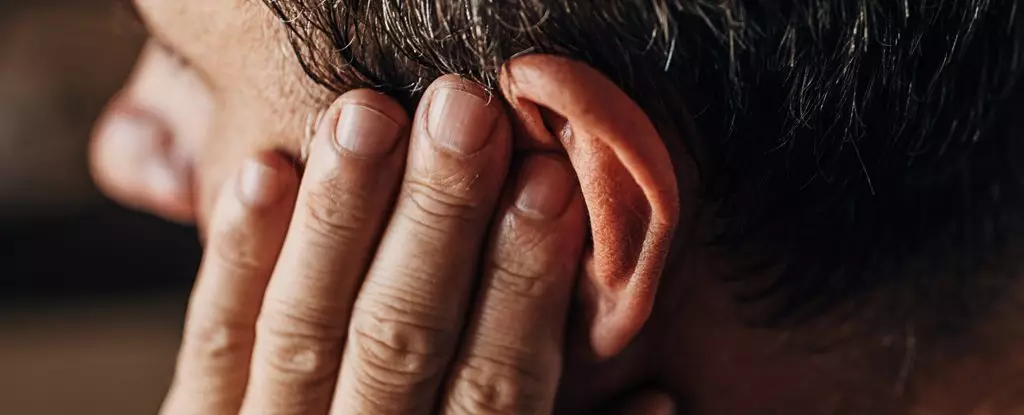Tinnitus, a common condition affecting approximately 15 percent of the global population, manifests as the perception of sound—most frequently experienced as ringing or buzzing—without any external auditory stimuli. It is particularly common among individuals with hearing loss but can also affect those with perfectly functional hearing capabilities. While the noise associated with tinnitus can vary widely from person to person, it is undeniably intrusive, leading to substantial discomfort and frustration for those affected. More alarmingly, long-term tinnitus sufferers may find their quality of life significantly diminished, with an increased risk of mental health issues such as anxiety and depression.
The quest to manage tinnitus effectively is critical, especially considering the absence of a definitive cure. Without an established remedy, emphasis has shifted towards understanding effective management strategies. Recent research suggests a connection between sleep patterns and tinnitus, indicating that sleep may play a more significant role in experiencing and coping with this perplexing condition than previously imagined.
A fascinating aspect of tinnitus lies in its classification as a phantom perception. This phenomenon occurs when the brain generates sensory experiences—visual, auditory, or olfactory—that do not exist in the external environment. While many individuals experience these phantom perceptions primarily during sleep, those with tinnitus may find themselves encountering these fabricated sounds while fully awake. Understanding this relationship is crucial because it invites further exploration into the brain’s workings and the mechanisms that lead to phantom sound perceptions.
The neurological basis of tinnitus may shed light on its interactions with sleep. Research indicates that tinnitus can disrupt normal brain function, particularly in auditory processing areas. When we sleep, our brain activity undergoes alterations; for individuals experiencing tinnitus, this disruption could exacerbate the distress associated with their condition.
The Sleep Cycle and Its Impacts
Sleep comprises multiple stages, with slow-wave sleep, or deep sleep, deemed vital for restorative processes. During this stage, the brain demonstrates pronounced activity changes, which are crucial for cognitive functions such as memory consolidation and sound processing. Yet, it’s important to note that not all brain areas experience this activity equally. Individuals dealing with tinnitus may display patterns of hyperactivity in certain regions even during sleep, perhaps causing further disturbances and contributing to negative sleep experiences.
Research indicates that those afflicted by tinnitus may experience a higher prevalence of sleep disturbances, such as insomnia and night terrors. Their sleep is often less deep compared to individuals without tinnitus, leading to a fragmented and less restorative resting period. This unfortunate cycle not only exacerbates the experience of tinnitus but also contributes to broader implications for mental and emotional wellbeing.
Deep Sleep: A Potential Sanctuary for Tinnitus
Despite the challenges posed by tinnitus, some studies suggest that certain aspects of deep sleep may positively influence the perception of these phantom sounds. As individuals enter periods of deep sleep, their brain functions differently, with neurons entering a restorative state that may inadvertently reduce tinnitus intensity. This intriguing hypothesis proposes that the brain, during its most profound states of sleep, may effectively suppress tinnitus, offering a brief respite from its incessant ringing.
The dynamics of sleep suggest that intensified slow-wave activity could form a protective barrier against the noise created by tinnitus. As sleep progresses into deeper phases, the brain’s electrical activity may inhibit hyperactive regions, potentially averting interruptions from tinnitus and allowing the individual to enjoy deeper, more restful rest.
The understanding of tinnitus and its relationship with sleep opens a wealth of avenues for future research. By tracking sleep stages and the variations in tinnitus perception concurrently, scientists could uncover essential insights that may lead to innovative treatments tailored to improve patient wellbeing.
Moreover, behavioral adjustments such as sleep restriction techniques are gaining attention. These strategies effectively gear relief for tinnitus patients by encouraging them to go to bed solely when they feel genuinely fatigued, thus potentially enhancing their deep sleep intensity.
Additionally, there remain other sleep stages like rapid eye movement (REM) sleep, which may have unique influences on tinnitus as well. Enhanced tracking of brain activity during these varied sleep phases merits exploration and could lead to more targeted interventions that leverage brain activity to mitigate tinnitus perceptions.
The interplay between tinnitus and sleep signifies a complex relationship that warrants deep exploration. With growing evidence suggesting that sleep quality is intricately linked to the experience of tinnitus, further research holds promise for developing new management strategies. As we unlock the mysteries surrounding the brain’s response to sleep, we may pave the way for improved treatments that could help millions achieve relief and enhance their overall quality of life. Understanding this relationship may be the key to diminishing the burdens of this persistent and often debilitating condition.


Leave a Reply